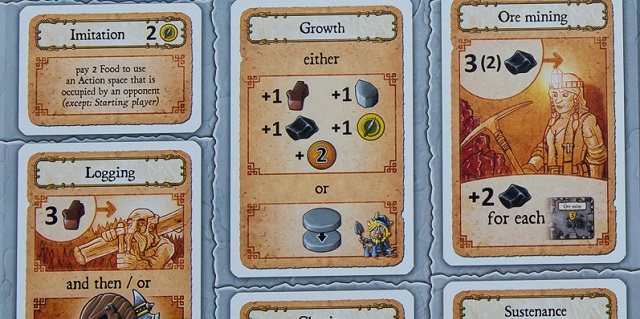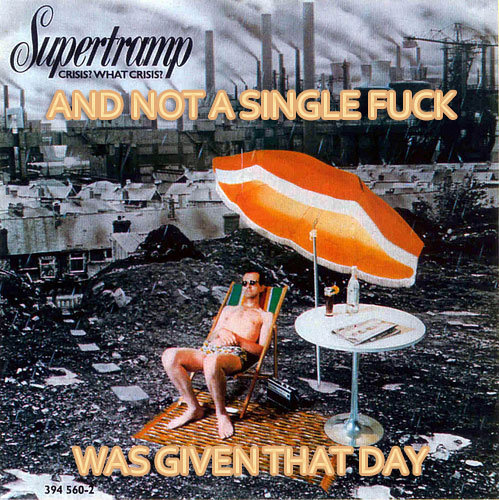4 Players: W, S, G, K
Game: Caverna
Choice: S
Location: S

Game One
G (96 pts), W (80 pts), S (73 pts) & K (68 pts)
Final Tally:
G was declared this week's victor
Game Notes:
- the etymology and meaning of "seminal" was debated
- there was an error in play on the final round that was not noticed until too late: the final harvest was supposed to be limited in that each player had to choose to skip either the field or the breeding phase. This was forgotten and all players did both phases. It was decided that the all players benefitted more or less evenly and that while the final scores would have been slightly lower, the outcome in terms of order would have remained the same.
Supertramp: Breakfast In America (1979)
 [Notes from AllMusic.com] With Breakfast in America, Supertramp had a genuine blockbuster hit, topping the charts for four weeks in the U.S. and selling millions of copies worldwide; by the 1990s, the album had sold over 18 million units across the world. Although their previous records had some popular success, they never even hinted at the massive sales of Breakfast in America. Then again, Supertramp's earlier records weren't as pop-oriented as Breakfast. The majority of the album consisted of tightly written, catchy, well-constructed pop songs, like the hits "The Logical Song," "Take the Long Way Home," and "Goodbye Stranger." Supertramp still had a tendency to indulge themselves occasionally, but Breakfast in America had very few weak moments. It was clearly their high-water mark.
[Notes from AllMusic.com] With Breakfast in America, Supertramp had a genuine blockbuster hit, topping the charts for four weeks in the U.S. and selling millions of copies worldwide; by the 1990s, the album had sold over 18 million units across the world. Although their previous records had some popular success, they never even hinted at the massive sales of Breakfast in America. Then again, Supertramp's earlier records weren't as pop-oriented as Breakfast. The majority of the album consisted of tightly written, catchy, well-constructed pop songs, like the hits "The Logical Song," "Take the Long Way Home," and "Goodbye Stranger." Supertramp still had a tendency to indulge themselves occasionally, but Breakfast in America had very few weak moments. It was clearly their high-water mark.Supertramp: Even in the Quietest Moments... (1977)
 [Notes from AllMusic.com] The title of Even in the Quietest Moments... isn't much of an exaggeration -- this 1977 album finds Supertramp indulging in some of their quietest moments, spending almost the album in a subdued mood. Actually, the cover photo picture of a snow-covered piano sitting on a mountain gives a good indication of what the album sounds like: it's elegant yet mildly absurd, witty but kind of obscure. It also feels more pop than it actually is, despite the opening single, "Give a Little Bit," their poppiest song to date, as well as their biggest hit. If the rest of the album doesn't boast another song as tight or concise as this -- "Downstream" comes close but it doesn't have the same hook, while "Babaji," a pseudo-spiritual moment that falls from the pop mark; the other four tracks clock in well over six minutes, with the closer, "Fool's Overture," reaching nearly 11 minutes -- it nevertheless places a greater emphasis on melody and gentle textures than any previous Supertramp release. So, it's a transitional album, bridging the gap between Crime of the Century and the forthcoming Breakfast in America, and even if it's not as full formed as either, it nevertheless has plenty of fine moments aside from "Give a Little Bit," including the music hall shuffle of "Loverboy," the Euro-artiness of "From Now On," and the "Fool on a Hill" allusions on "Fool's Overture."
[Notes from AllMusic.com] The title of Even in the Quietest Moments... isn't much of an exaggeration -- this 1977 album finds Supertramp indulging in some of their quietest moments, spending almost the album in a subdued mood. Actually, the cover photo picture of a snow-covered piano sitting on a mountain gives a good indication of what the album sounds like: it's elegant yet mildly absurd, witty but kind of obscure. It also feels more pop than it actually is, despite the opening single, "Give a Little Bit," their poppiest song to date, as well as their biggest hit. If the rest of the album doesn't boast another song as tight or concise as this -- "Downstream" comes close but it doesn't have the same hook, while "Babaji," a pseudo-spiritual moment that falls from the pop mark; the other four tracks clock in well over six minutes, with the closer, "Fool's Overture," reaching nearly 11 minutes -- it nevertheless places a greater emphasis on melody and gentle textures than any previous Supertramp release. So, it's a transitional album, bridging the gap between Crime of the Century and the forthcoming Breakfast in America, and even if it's not as full formed as either, it nevertheless has plenty of fine moments aside from "Give a Little Bit," including the music hall shuffle of "Loverboy," the Euro-artiness of "From Now On," and the "Fool on a Hill" allusions on "Fool's Overture." Supertramp: Crisis? What Crisis? (1975)
 [Notes from AllMusic.com] Nestled between the accomplished Crime of the Century album and 1977's Even in the Quietest Moments, Crisis? What Crisis? may not have given the band any chart success, but it did help them capture a fan base that had no concern for Supertramp's commercial sound. With Rick Davies showing off his talent on the keyboards, and Roger Hodgson's vocals soaring on almost every track, they managed to win back their earlier progressive audience while gaining new fans at the same time. Crisis received extensive air play on FM stations, especially in Britain, and the album made it into the Top 20 there and fell just outside the Top 40 in the U.S. "Ain't Nobody But Me," "Easy Does It," and the beautiful "Sister Moonshine" highlight Supertramp's buoyant and brisk instrumental and vocal alliance, while John Helliwell's saxophone gives the album even greater width. The songwriting is sharp, attentive, and passionate, and the lyrics showcase Supertramp's ease at invoking emotion into their music, which would be taken to even greater heights in albums to come. Even simple tracks like "Lady" and "Just a Normal Day" blend in nicely with the album's warm personality and charmingly subtle mood. Although the tracks aren't overly contagious or hook laden, there's still a work-in-process type of appeal spread through the cuts, which do grow on you over time.
[Notes from AllMusic.com] Nestled between the accomplished Crime of the Century album and 1977's Even in the Quietest Moments, Crisis? What Crisis? may not have given the band any chart success, but it did help them capture a fan base that had no concern for Supertramp's commercial sound. With Rick Davies showing off his talent on the keyboards, and Roger Hodgson's vocals soaring on almost every track, they managed to win back their earlier progressive audience while gaining new fans at the same time. Crisis received extensive air play on FM stations, especially in Britain, and the album made it into the Top 20 there and fell just outside the Top 40 in the U.S. "Ain't Nobody But Me," "Easy Does It," and the beautiful "Sister Moonshine" highlight Supertramp's buoyant and brisk instrumental and vocal alliance, while John Helliwell's saxophone gives the album even greater width. The songwriting is sharp, attentive, and passionate, and the lyrics showcase Supertramp's ease at invoking emotion into their music, which would be taken to even greater heights in albums to come. Even simple tracks like "Lady" and "Just a Normal Day" blend in nicely with the album's warm personality and charmingly subtle mood. Although the tracks aren't overly contagious or hook laden, there's still a work-in-process type of appeal spread through the cuts, which do grow on you over time.


No comments:
Post a Comment